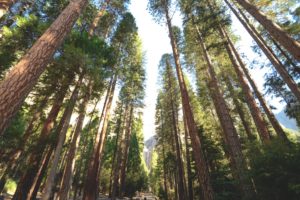
As I begin to write this article I am sitting in the middle of a York Region Forest on a beautiful sunny day, taking in all the sounds, smells, sights and textures that nature has to offer. A Japanese phrase for spending time in nature is shinrin-yoku, which translates to ‘forest bathing’. In this moment, I feel like I am experiencing this concept personally as I soak in the soothing realm of nature. In an effort to explain and promote the idea that human beings are inextricably connected to the natural world, the American biologist E.O. Wilson popularized the term biophilia, meaning ‘love of life and the living world’, and suggested that it is in our DNA because of the millions of years we have spent in close contact with nature.
Our recent history reveals an unfortunate trend away from nature as more and more of the world’s population now lives in cities. Intuitively, many cultures around the world have for a long time recognized the positive effect of spending time in the natural world. Today we have extensive scientific research that has unearthed (pardon the pun) many specific ways in which nature benefits our well-being. The research has revealed that nature’s influence covers a range of areas including improved mental health, immune system enhancement, increased benefits derived from exercise and boosted brain function such as cognition and creativity. It is regarded by some experts as so vital to our well-being that they refer to it as Vitamin G (greenspace) or Vitamin N (nature). The specific effects on our bodies include:
- Reduce blood pressure
- Lower stress
- Improve cardiovascular and metabolic health
- Lower blood-sugar levels
- Improve concentration and memory
- Reduce depression
- Improve pain thresholds
- Improve energy
- Boost immune system by increasing the body’s natural killer cells.
So, how do we reap the benefits nature has to offer and get our dose of Vitamin G or N?
A simple first step could be to bring nature indoors. Besides the visual impact of having plants in your home or office, they also help to purify the air which can be more polluted than outdoor air. Another way is to use essential oils, especially those of the conifer family, to imitate the smells when you can’t get to a forest on a daily basis.
Regular exercise is a fundamental component of well-being and research has shown that when we take it outdoors we are happier, less tired and derive an extended energy boost compared to exercising indoors. These subjective findings have been backed-up with measurable data showing reduced blood pressure and stress hormone levels. If you are a walker or a runner, try and find a park or some kind of natural setting. Also, if possible, spend part of your time moving on natural surfaces such as the grass or an unpaved trail. This challenges many often underused muscles of the legs and ankles in a novel way which strengthens them and enhances overall mobility.
The practice of shinrin-yoku can take the nature experience to an even deeper level. It involves spending time in a forest in a very specific way. The goal is to allow all of your senses to take in the forest atmosphere by approaching the walk mindfully, taking time to stop and soak it all in.
Consuming a diet based primarily on whole foods in their natural form is another way to support your well-being and re-connect with the world in which we evolved.
As Spring finally bursts forth in this part of the planet I find myself drawn even more to the out of doors. One of my favourite quotes sums this up perfectly:
“I go to nature to be soothed and healed, and to have my senses put in order.” John Burroughs
By Lori Andrade, BPHE, CSEP. Lori is a Certified Urban Pole Walking instructor and Personal Trainer. Body Design offers Personal Training & Yoga classes to assist individuals achieve their health, fitness and weight loss goals. www.bodydesign.ca